Campus/People
-
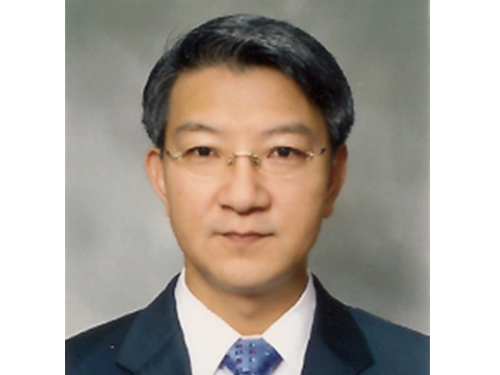 Distinguished Professor Sang Yup Lee Gives Special Lecture at Tianjin University, China
Distinguished Professor Sang Yup Lee from the Department of Chemical and Biomolecular Engineering at KAIST gave a special lecture at Tianjin University, China, on September 12, 2014.
The university has invited prestigious scholars and scientists including Nobel Prize laureates from all around the world to their program called the "BeiYang Lecture Series."
Professor Lee said:
"The lecture series has invited many eminent global leaders such as Dr. Steven Chu, who received the Nobel Prize in Physics in 1997 and also served the 12th United States Secretary of Energy. It is a great honor to participate in the program as a speaker. The university told me that in recognition of my research in the development of sustainable biochemical industry through systems metabolic engineering, I was invited to speak.”
Professor Lee presented his speech entitled “Production of Chemical Materials through Microorganism Metabolic Systems Engineering” and took questions from the audience.
Professor Lee developed the world’s most efficient microorganism and bioprocess such as succinate, butanol, and engineering plastic raw materials. In recent years, he has succeeded in producing a small quantity of gasoline through converting in-vivo generated fatty acids.
2014.09.16 View 8323
Distinguished Professor Sang Yup Lee Gives Special Lecture at Tianjin University, China
Distinguished Professor Sang Yup Lee from the Department of Chemical and Biomolecular Engineering at KAIST gave a special lecture at Tianjin University, China, on September 12, 2014.
The university has invited prestigious scholars and scientists including Nobel Prize laureates from all around the world to their program called the "BeiYang Lecture Series."
Professor Lee said:
"The lecture series has invited many eminent global leaders such as Dr. Steven Chu, who received the Nobel Prize in Physics in 1997 and also served the 12th United States Secretary of Energy. It is a great honor to participate in the program as a speaker. The university told me that in recognition of my research in the development of sustainable biochemical industry through systems metabolic engineering, I was invited to speak.”
Professor Lee presented his speech entitled “Production of Chemical Materials through Microorganism Metabolic Systems Engineering” and took questions from the audience.
Professor Lee developed the world’s most efficient microorganism and bioprocess such as succinate, butanol, and engineering plastic raw materials. In recent years, he has succeeded in producing a small quantity of gasoline through converting in-vivo generated fatty acids.
2014.09.16 View 8323 -
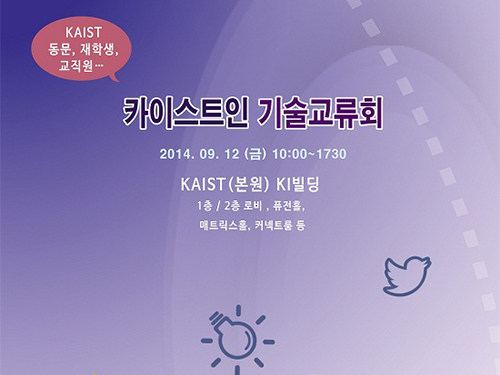 The Alumni Association of KAIST hosts the first KAIST Technology Exchange Meeting
The Alumni Association of KAIST hosted the first KAIST Technology Exchange Meeting on September 12th at the KAIST Institute on campus.
About 14 alumni companies, MDS Technology, Biospace, and Satrec Initiative, two private equity funds including KAIST Entrepreneurship Foundation, and KAIST Technology Commercialization Center participated in this meeting.
This meeting was organized by the Alumni Association of KAIST in order to strengthen cooperation between alumni companies and KAIST members by increasing technology exchange and fostering cooperative culture.
The meeting comprised of two sessions: product exhibition and technology-exchange session.
During the exhibition, participating companies prepared the following: product showcase, intellectual property exchange, project consulting, and employment information.
Companies involved in technology-exchange session not only showcased their brand new technology but also shared their innovative ideas and entrepreneur vision, and discussed joint R&D.
The president of the Alumni Association of KAIST, Man Kee Baek who was in charge of this meeting said, “I hope this meeting stimulates more technology exchange between alumni companies and school members.”
He added that “our alumni association will continue to organize many projects for better KAIST.”
Detailed information about the event can be found on the official webpage of the Alumni Association of KAIST (http://www.ilovekaist.net), and this event was open to the public.
A company specializing in medical devices, Biospace, plans to donate a body composition analyzer and an automatic blood pressure meter worth 14,000,000 won to KAIST.
2014.09.15 View 6514
The Alumni Association of KAIST hosts the first KAIST Technology Exchange Meeting
The Alumni Association of KAIST hosted the first KAIST Technology Exchange Meeting on September 12th at the KAIST Institute on campus.
About 14 alumni companies, MDS Technology, Biospace, and Satrec Initiative, two private equity funds including KAIST Entrepreneurship Foundation, and KAIST Technology Commercialization Center participated in this meeting.
This meeting was organized by the Alumni Association of KAIST in order to strengthen cooperation between alumni companies and KAIST members by increasing technology exchange and fostering cooperative culture.
The meeting comprised of two sessions: product exhibition and technology-exchange session.
During the exhibition, participating companies prepared the following: product showcase, intellectual property exchange, project consulting, and employment information.
Companies involved in technology-exchange session not only showcased their brand new technology but also shared their innovative ideas and entrepreneur vision, and discussed joint R&D.
The president of the Alumni Association of KAIST, Man Kee Baek who was in charge of this meeting said, “I hope this meeting stimulates more technology exchange between alumni companies and school members.”
He added that “our alumni association will continue to organize many projects for better KAIST.”
Detailed information about the event can be found on the official webpage of the Alumni Association of KAIST (http://www.ilovekaist.net), and this event was open to the public.
A company specializing in medical devices, Biospace, plans to donate a body composition analyzer and an automatic blood pressure meter worth 14,000,000 won to KAIST.
2014.09.15 View 6514 -
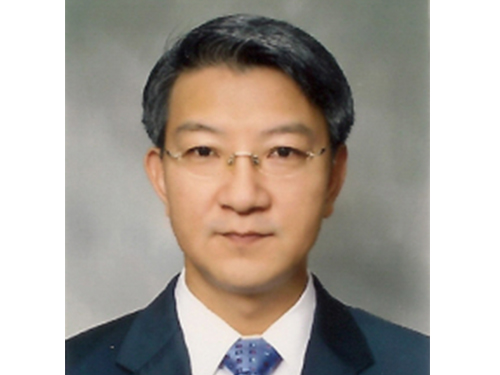 Distinguished Professor Sang Yup Lee Participates in the 2014 Summer Davos Forum
Distinguished Professor Sang Yup Lee from the Department of Chemical and Biomolecular Engineering, KAIST, was invited to lead four sessions at the Annual Meeting 2014, the World Economic Forum, also known as the Summer Davos Forum, which was held in Tianjin, China, from September 10th to 12th.
Two of the four sessions Professor Lee participated in were held on September 10th. At the first session entitled “Biotechnology Ecosystem,” he examined with other panelists the future of bioengineering in depth and discussed major policies and industry trends that will be necessary for the development of future biotechnologies.
Professor Lee later attended the “Strategic Shifts in Healthcare” session as a moderator. Issues related to transforming the health industry such as the next-generation genomics, mobile health and telemedicine, and wearable devices and predictive analytics were addressed.
On September 12, Professor Lee joined the “IdeasLab with KAIST” and gave a presentation on nanotechnology. There was a total of ten IdeasLab sessions held at the Summer Davos Forum, and KAIST was the only Korean university ever invited to host this session. In addition to Professor Lee’s presentation, three more presentations were made by KAIST professors on such topics as “Sustainable Energy and Materials” and “Next-generation Semiconductors.”
Lastly, Professor Lee participated in the “Global Promising Technology” session with the World Economic Forum’s Global Agenda Council members. At this session, he explained the selection of the “World’s Top 10 Most Promising Technologies” and “Bio Sector’s Top 10 Technologies” and led discussions about the “2015 Top 10 Technologies” with the council members.
The Davos Forum has been announcing the “World’s Top 10 Most Promising Technologies” since 2012, and Professor Lee has played a key role in the selection while working as the Chairman of Global Agenda Council. The selection results are presented at the Davos Forum every year and have attracted a lot of attention from around the world.
2014.09.15 View 10540
Distinguished Professor Sang Yup Lee Participates in the 2014 Summer Davos Forum
Distinguished Professor Sang Yup Lee from the Department of Chemical and Biomolecular Engineering, KAIST, was invited to lead four sessions at the Annual Meeting 2014, the World Economic Forum, also known as the Summer Davos Forum, which was held in Tianjin, China, from September 10th to 12th.
Two of the four sessions Professor Lee participated in were held on September 10th. At the first session entitled “Biotechnology Ecosystem,” he examined with other panelists the future of bioengineering in depth and discussed major policies and industry trends that will be necessary for the development of future biotechnologies.
Professor Lee later attended the “Strategic Shifts in Healthcare” session as a moderator. Issues related to transforming the health industry such as the next-generation genomics, mobile health and telemedicine, and wearable devices and predictive analytics were addressed.
On September 12, Professor Lee joined the “IdeasLab with KAIST” and gave a presentation on nanotechnology. There was a total of ten IdeasLab sessions held at the Summer Davos Forum, and KAIST was the only Korean university ever invited to host this session. In addition to Professor Lee’s presentation, three more presentations were made by KAIST professors on such topics as “Sustainable Energy and Materials” and “Next-generation Semiconductors.”
Lastly, Professor Lee participated in the “Global Promising Technology” session with the World Economic Forum’s Global Agenda Council members. At this session, he explained the selection of the “World’s Top 10 Most Promising Technologies” and “Bio Sector’s Top 10 Technologies” and led discussions about the “2015 Top 10 Technologies” with the council members.
The Davos Forum has been announcing the “World’s Top 10 Most Promising Technologies” since 2012, and Professor Lee has played a key role in the selection while working as the Chairman of Global Agenda Council. The selection results are presented at the Davos Forum every year and have attracted a lot of attention from around the world.
2014.09.15 View 10540 -
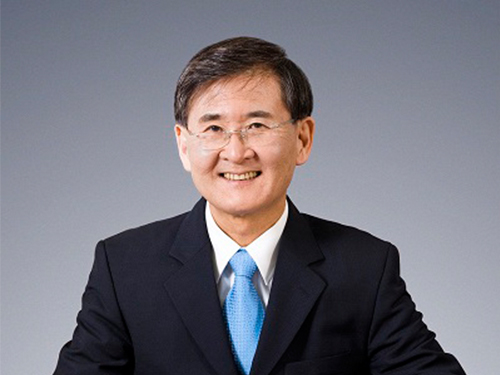 President Steve Kang of KAIST Attends the 2014 Summer Davos Forum in Tianjin, China
President Steve Kang of KAIST will attend the 2014 Annual Meeting of the New Champions, the World Economic Forum (WEF), to be held on September 10-12, 2014 in Tianjin, China.
KAIST holds its own IdeasLab session on nanotechnology on September 12, 2014.
On September 10, 2014, President Steve Kang will participate in a private session hosted by the Global University Leaders Forum (GULF) community at WEF as a panelist.
In addition to President Kang, eight presidents from top global universities such as the National University of Singapore, Peking University, ETH Zurich (Swiss Federal Institute of Technology), University of Tokyo, and Carnegie Mellon University will join the panel discussion under the topic, “Increasing the Translational Impact of University Research.” Specifically, the presidents will address issues related to the importance of university-led technology transfer in Asia, key strategies and goals for technology transfer, and implementation approaches taken by each university to promote technology transfer from university to industry.
President Kang was invited to this GULF session, the only attendant from Korean universities, in recognition of his long time experience and expertise in education and research.
In 2006, WEF created the GULF, a small community of the presidents of top universities in the world, aiming to offer an open platform for high-level dialogues on issues of higher education and research with other sectors, as well as to foster collaboration between universities in areas of significance for global policy.
As of 2014, a total of 25 globally leading universities, including Harvard University, University of Cambridge, and Massachusetts Institute of Technology, are GULF members. KAIST, which joined the club this year, is the only Korean university.
The 2014 Annual Meeting of the New Champions, also known as the Summer Davos Forum, hosts numerous sessions under the theme of “Creating Value through Innovation.” At the Forum, a total of ten IdeasLab sessions will be hosted. KAIST was invited to run its own IdeasLab on nanotechnology on September 12, 2014.
Together with President Kang, Professors Sang Ouk Kim and Keon Jae Lee from the Department of Materials Science Engineering, KAIST, and Professors Sang Yup Lee and Hyunjoo Lee from the Department of Chemical and Biomolecular Engineering, KAIST, will present their own speeches on the topic entitled “From diagnostics to materials, how is nanotechnology changing lives?”
President Kang will give the opening speech at the KAIST IdeasLab.
He said that an invitation from WEF to join the IdeasLab spoke well for KAIST:
“KAIST is the first and the only Korean university ever invited to run its own IdeasLab at the World Economic Forum. The IdeasLab is an expert group meeting, conducted only by the world’s most prestigious universities and research institutes. At the IdeasLab sessions, global leaders from different sectors identify major issues facing higher education and humanity and explore solutions through science and technology innovation. Holding our own IdeasLab on one of our strongest fields, nanotechnology, is indeed an excellent opportunity for KAIST to show its strength in academic and research excellence on the global stage.”
2014.09.08 View 12487
President Steve Kang of KAIST Attends the 2014 Summer Davos Forum in Tianjin, China
President Steve Kang of KAIST will attend the 2014 Annual Meeting of the New Champions, the World Economic Forum (WEF), to be held on September 10-12, 2014 in Tianjin, China.
KAIST holds its own IdeasLab session on nanotechnology on September 12, 2014.
On September 10, 2014, President Steve Kang will participate in a private session hosted by the Global University Leaders Forum (GULF) community at WEF as a panelist.
In addition to President Kang, eight presidents from top global universities such as the National University of Singapore, Peking University, ETH Zurich (Swiss Federal Institute of Technology), University of Tokyo, and Carnegie Mellon University will join the panel discussion under the topic, “Increasing the Translational Impact of University Research.” Specifically, the presidents will address issues related to the importance of university-led technology transfer in Asia, key strategies and goals for technology transfer, and implementation approaches taken by each university to promote technology transfer from university to industry.
President Kang was invited to this GULF session, the only attendant from Korean universities, in recognition of his long time experience and expertise in education and research.
In 2006, WEF created the GULF, a small community of the presidents of top universities in the world, aiming to offer an open platform for high-level dialogues on issues of higher education and research with other sectors, as well as to foster collaboration between universities in areas of significance for global policy.
As of 2014, a total of 25 globally leading universities, including Harvard University, University of Cambridge, and Massachusetts Institute of Technology, are GULF members. KAIST, which joined the club this year, is the only Korean university.
The 2014 Annual Meeting of the New Champions, also known as the Summer Davos Forum, hosts numerous sessions under the theme of “Creating Value through Innovation.” At the Forum, a total of ten IdeasLab sessions will be hosted. KAIST was invited to run its own IdeasLab on nanotechnology on September 12, 2014.
Together with President Kang, Professors Sang Ouk Kim and Keon Jae Lee from the Department of Materials Science Engineering, KAIST, and Professors Sang Yup Lee and Hyunjoo Lee from the Department of Chemical and Biomolecular Engineering, KAIST, will present their own speeches on the topic entitled “From diagnostics to materials, how is nanotechnology changing lives?”
President Kang will give the opening speech at the KAIST IdeasLab.
He said that an invitation from WEF to join the IdeasLab spoke well for KAIST:
“KAIST is the first and the only Korean university ever invited to run its own IdeasLab at the World Economic Forum. The IdeasLab is an expert group meeting, conducted only by the world’s most prestigious universities and research institutes. At the IdeasLab sessions, global leaders from different sectors identify major issues facing higher education and humanity and explore solutions through science and technology innovation. Holding our own IdeasLab on one of our strongest fields, nanotechnology, is indeed an excellent opportunity for KAIST to show its strength in academic and research excellence on the global stage.”
2014.09.08 View 12487 -
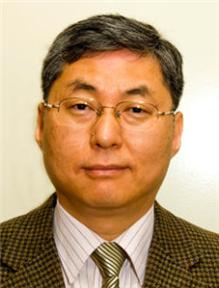 Kiseok Song, a Ph.D. candidate in the Electrical Engineering Department, receives the 2014 Marconi Society Young Scholar Award
Established
in 1974 to commemorate the eminent Italian inventor and electrical engineer,
Guglielmo Marconi, the Marconi Society has recognized significant contributions
in science and technology by awarding the Marconi Prize, with an annual USD
100,000 grant, to a living scientist who has made great advancements in
communications technology.
Along
with the Marconi Prize, the Society has been presenting the Young Scholars
Awards over the past six years to reward young and emerging scientists’ brilliant
academic and research achievements as well as their entrepreneurship. For this
year’s seventh Young Scholar Awards, a KAIST doctoral student was selected as
one of the two recipients.
Kiseok
Song, a Ph.D. candidate in the Department of Electrical Engineering, KAIST, has
been named as a 2014 Marconi Society Paul Baran Young Scholar. The Marconi Society said that Song was being recognized for "his
academic achievements and leadership in the field of communications and
information science,” according to a press release distributed by the Society on August 28, 2014.
Studying
under the advice of Professor Hoi-Jun Yoo of the Department of Electrical
Engineering at KAIST, Song has developed bio-medical System on a Chip (SoC)
such as smart wireless bio-medical systems combined with optimized SoCs,
compact bio-medical patch systems connected to smart phones, smart electro-acupuncture
and transdermal drug delivery, and multi-modal non-invasive glucose monitors.
The
press release quoted Professor Yoo’s comment on the meaning of Song’s research:
“All
of these bio-medical systems open a new healthcare paradigm to improve people’s
quality of life in combination with the current mobile smart phones.”
In
addition to Song, Himanshu Asnani, a Stanford Ph.D. candidate and system engineer
at Ericsson Silicon Valley, received the other award. The award
ceremony will be held at the Marconi Society’s annual award gala at the
National Academies of Science Building in Washington D.C., on October 2, 2014.
For
details, please read the following press release:
The
Marconi Society, Press Release, August 28, 2014
“Kiseok
Song Receives the 2014 Marconi Society Young Scholar Award”
http://www.marconisociety.org/press/2014Song.html
2014.09.08 View 7753
Kiseok Song, a Ph.D. candidate in the Electrical Engineering Department, receives the 2014 Marconi Society Young Scholar Award
Established
in 1974 to commemorate the eminent Italian inventor and electrical engineer,
Guglielmo Marconi, the Marconi Society has recognized significant contributions
in science and technology by awarding the Marconi Prize, with an annual USD
100,000 grant, to a living scientist who has made great advancements in
communications technology.
Along
with the Marconi Prize, the Society has been presenting the Young Scholars
Awards over the past six years to reward young and emerging scientists’ brilliant
academic and research achievements as well as their entrepreneurship. For this
year’s seventh Young Scholar Awards, a KAIST doctoral student was selected as
one of the two recipients.
Kiseok
Song, a Ph.D. candidate in the Department of Electrical Engineering, KAIST, has
been named as a 2014 Marconi Society Paul Baran Young Scholar. The Marconi Society said that Song was being recognized for "his
academic achievements and leadership in the field of communications and
information science,” according to a press release distributed by the Society on August 28, 2014.
Studying
under the advice of Professor Hoi-Jun Yoo of the Department of Electrical
Engineering at KAIST, Song has developed bio-medical System on a Chip (SoC)
such as smart wireless bio-medical systems combined with optimized SoCs,
compact bio-medical patch systems connected to smart phones, smart electro-acupuncture
and transdermal drug delivery, and multi-modal non-invasive glucose monitors.
The
press release quoted Professor Yoo’s comment on the meaning of Song’s research:
“All
of these bio-medical systems open a new healthcare paradigm to improve people’s
quality of life in combination with the current mobile smart phones.”
In
addition to Song, Himanshu Asnani, a Stanford Ph.D. candidate and system engineer
at Ericsson Silicon Valley, received the other award. The award
ceremony will be held at the Marconi Society’s annual award gala at the
National Academies of Science Building in Washington D.C., on October 2, 2014.
For
details, please read the following press release:
The
Marconi Society, Press Release, August 28, 2014
“Kiseok
Song Receives the 2014 Marconi Society Young Scholar Award”
http://www.marconisociety.org/press/2014Song.html
2014.09.08 View 7753 -
 Professor Ilkwon Oh Receives the Energy Technology Innovation Award
Professor Ilkwon Oh from the Division of Ocean Systems Engineering at the School of Mechanical and Aerospace Engineering, KAIST, received the Energy Technology Innovation Award at the Energy Tech Insight 2014 Conference, which was held on August 28, 2014 at COEX in Seoul. The conference was co-hosted by the Ministry of Trade, Industry & Energy, Republic of Korea, and the Korea Institute of Energy Technology Evaluation and Planning.
Professor Oh has been recognized for his distinguished research on a synthetic technology to develop 3-dimensional carbon nanostructures based on defect engineering and for his efforts to apply this technology to produce cathode materials for high performance, high density lithium-ion secondary batteries.
In 2010, the Ministry of Education, the Republic of Korea, and the National Research Foundation of Korea included Professor Oh's research in the 100 Best Research in Basic Sciences of the Year, and the 50 Best Research in Basic Sciences in 2012 and 2014, respectively.
2014.09.07 View 7980
Professor Ilkwon Oh Receives the Energy Technology Innovation Award
Professor Ilkwon Oh from the Division of Ocean Systems Engineering at the School of Mechanical and Aerospace Engineering, KAIST, received the Energy Technology Innovation Award at the Energy Tech Insight 2014 Conference, which was held on August 28, 2014 at COEX in Seoul. The conference was co-hosted by the Ministry of Trade, Industry & Energy, Republic of Korea, and the Korea Institute of Energy Technology Evaluation and Planning.
Professor Oh has been recognized for his distinguished research on a synthetic technology to develop 3-dimensional carbon nanostructures based on defect engineering and for his efforts to apply this technology to produce cathode materials for high performance, high density lithium-ion secondary batteries.
In 2010, the Ministry of Education, the Republic of Korea, and the National Research Foundation of Korea included Professor Oh's research in the 100 Best Research in Basic Sciences of the Year, and the 50 Best Research in Basic Sciences in 2012 and 2014, respectively.
2014.09.07 View 7980 -
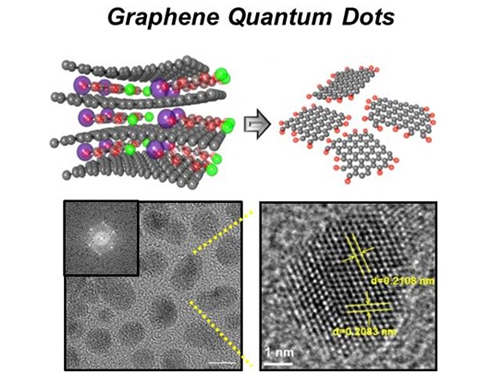 News Article on the Development of Synthesis Process for Graphene Quantum Dots
Before It's News, an international online news agency, highlighted the recent research conducted by KAIST professors (Seokwoo Jeon of the Department of Materials Science and Engineering, Yong-Hoon Cho of the Department of Physics, and Seunghyup Yoo of the Department of Electrical Engineering) on the development of synthesis process for graphene quantum dots, nanometer-sized round semiconductor nanoparticles that are very efficient at emitting photons. If commercialized, this synthetic technology will lead the way to the development of paper-thin displays in the future.
For the article, please go to the link below:
Before It’s News, September 3, 2014“Graphene quantum dots prove highly efficient in emitting light”
http://beforeitsnews.com/science-and-technology/2014/09/graphene-quantum-dots-prove-highly-efficient-in-emitting-light-2718190.html
2014.09.07 View 11533
News Article on the Development of Synthesis Process for Graphene Quantum Dots
Before It's News, an international online news agency, highlighted the recent research conducted by KAIST professors (Seokwoo Jeon of the Department of Materials Science and Engineering, Yong-Hoon Cho of the Department of Physics, and Seunghyup Yoo of the Department of Electrical Engineering) on the development of synthesis process for graphene quantum dots, nanometer-sized round semiconductor nanoparticles that are very efficient at emitting photons. If commercialized, this synthetic technology will lead the way to the development of paper-thin displays in the future.
For the article, please go to the link below:
Before It’s News, September 3, 2014“Graphene quantum dots prove highly efficient in emitting light”
http://beforeitsnews.com/science-and-technology/2014/09/graphene-quantum-dots-prove-highly-efficient-in-emitting-light-2718190.html
2014.09.07 View 11533 -
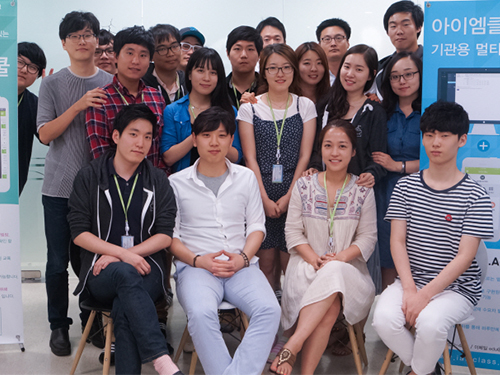 IAMCOMPANY, an educational technology startup created by a KAIST student
In-Mo Chung, a senior student of the Department of Industrial Design at KAIST, developed a mobile homework book application, IAMSCHOOL, in order to help parents engage, more interactively, in their children’s school activities.
Chung said in an interview with KAIST:
“I came up with creating my company, IAMCOMPANY, when I worked as a volunteer for a student club in 2009 that provides an educational service to high school students living in a less-favored environment. I found out their educational environment very poor, which ultimately led me to build a public interest business model for education.”
Chung created a few mobile applications including IAMSCHOOL and IAMCLASS. The application, IAMSCHOOL, receives school’s notices, homework assignments, or any information related to classes and sends them directly and immediately to parents, allowing real-time communications between parents and teachers. In Korea, parents usually check as many as 50 school notices per month.
Once registered, private educational institutes and public organizations can also receive school information through this application.
In July 2011, the Department of Science Management at KAIST hosted a student competition for startup ideas, and Chung’s idea to build an educational application won the best award. In 2012, he received the grand prize at the KAIST E-5 Startup Competition.
An undergraduate student who is the chief executive officer of a tech startup
Chung established IAMCOMPANY with the seed fund of 13 million Korean won that he had received from the city government of Daejeon. His business idea was selected as one of the 300 College Student Startup Projects, a startup support program operated by Daejeon City to encourage entrepreneurship among college and university students.
Chung talked about the background of his business:
“I think that my idea to offer a “free educational application” helped me win the first prize at the student startup competition. At that time, I was still young, so I considered the winning of the competition as an “exercise” to build my own business in the future. But when I actually started my company, I found out that KAIST’s startup programs helped me a lot throughout the entire process and realized that these programs are good enough for young entrepreneurs to build up their company from a single idea.”
KAIST professors and staff support student startups.
Chung took in-depth mentoring from KAIST professors. Professor Min-Hwa Lee of the Department of Management Science and Professor Lak-Kyoung Song of the Department of Technology Management, who is also the president of the Daejeon Creative Economy Innovation Center, have supported Chung’s endeavors. President Taek-Su Kang of the KAIST Innovation Center gave Chung a lot of advice as he was developing IAMCOMPANY’s initial business model. Chung said that even now, they look for solutions together when his business ran into a brick wall.
Professor Lee said, “IAMCOMPANY does not aim for profit. Instead, by supplying free applications, they improve the environment of education and eventually create public interest. Also, they find out consumers’ hidden demands and satisfied it creatively.”
With 8,000 schools registered to IAMSCHOOL, 750,000 parents are using the application in just two years of its release. Parents and teachers responded enthusiastically.
The application “IAMSCHOOL” provides services for 8,000 schools in Korea. Currently, 750,000 parents are using this application.
The company offers the nation’s largest online education service. The reason behind their rapid growth is that their service solves communications problems between schools and parents in a simple and efficient manner.
Jung-Mi Hwang, a teacher at Galma Elementary School in Dajeon, said:
“After using this application, there are fewer occasions of students forgetting their school materials. We think this is because the parents can check the school notices and newsletters at any time through the application.”
She added, “I hope more and more schools will use this application because it is convenient and also available for free.”
Another teacher from Daedeok Elementary School in Daejeon, Dong-Min Nam, said that “many parents like this application since they are immediately notified with school events.”
KAIST’s Technology Business Incubation Center
“After moving around many places due to expensive rent,” Chung said that “we finally moved into the Technology Business Incubation Center (TBIC) at KAIST. The center helped us not only providing the space, but also mentoring and connecting us with venture investment companies. This was a great help in attracting initial investments.”
Chung added:
“At first, a staff member from TBIC was concerned about the viability of my company. I was then an undergraduate student with zero business experience, and from his standpoint, I was taking a huge risk.”
But in several months after its establishment, IAMCOMPANY has grown to have 16 employees.
An investment of 1.5 billion Korean won from a venture capital company led to a sustainable growth.
In early stage, IAMCOMPANY received 300 million Korean won from a venture capital company, and it recently attracted additional 1.2 billion won from a leading venture capital. With these investments, the company grew further. Moreover, investments from large educational corporations have proved the value and competitiveness of the company in the education market.
Chung plans to expand his service globally, particularly in China and Singapore.
He said that he would not forget how he had started his business, and with such a focused mind, he would strive to provide students and parents with quality educational services while proactively incorporating the advanced information technology (IT) into his products.
A bold movement to Pangyo Techno Valley, a Korean version of Silicon Valley
Although the company started with only two members, as of August 2014, it boasts of having twenty employees, a remarkable leap of growth within just two years.
In April this year, Chung relocated his office from TBIC to Pangyo Techno Valley, the Silicon Valley of Korea, in order to provide a better work environment to his staff.
It was not an easy decision for him to leave the comfortable, well-known place, the KAIST campus, and the colleagues, including TBIC staff and KAIST professors, who had helped his startup efforts in early days. However, in order to recruit better employees and to access additional IT resources and education-related companies, Chung decided to make a bold movement, relocating his business to Pangyo Techno Valley in Seoul.
A reputable American venture capital investor, Timothy C. Draper, invested in IAMCOMPANY
Chung was able to secure solid support from an eminent global investor, Timothy C. Draper, the founder of Draper Fisher Jurvetson, a venture capital based in Menlo Park in California.
Recently, Draper, a legendary investor of the Silicon Valley, invested USD 20,000 in IAMCOMPANY. Draper discovered worldwide venture companies such as Hotmail, Skype, and Baidu. IAMCOMPANY received high marks from him as a company with a competitive edge in the global education market.
Chung met Draper in April 2014 when he participated in a television network’s (Korean Broadcasting System) audition program for startups. Draper was one of the judges for the program, and he was impressed by the robust growth of IAMCOMPANY. He eventually made a decision to chip in USD 20,000 in Chung’s company.
Chung said that he was glad to meet the tycoon of Silicon Valley who recognized the potential of his company.
In last October, IAMSCHOOL was selected for the K-APP Global Hub Program—a global market pioneering program to support the development of mobile applications—which was sponsored by the Small and Medium Business Administration in Korea.
IAMCOMPANY will bring ‘the Korean Wave’ in the area of educational applications.
Chung said, “We plan to sustainably manage the applications and add more functions, so that more educational institutions can adopt our application.”
The company aims to provide its service to over 11,000 schools and 100,000 academies nationally so that more parents are able to receive educational news and information easily.
Chung concluded his interview in an upbeat tone as he predicted the future of his company:
“I am proud that IAMSCHOOL is being recognized by the world’s best investor, and I have gained confidence to advance to the global market. Through global service, I want to make "the Korean Wave" in the field of educational applications and to receive appreciation from students, teachers, and parents worldwide.”
2014.09.04 View 9018
IAMCOMPANY, an educational technology startup created by a KAIST student
In-Mo Chung, a senior student of the Department of Industrial Design at KAIST, developed a mobile homework book application, IAMSCHOOL, in order to help parents engage, more interactively, in their children’s school activities.
Chung said in an interview with KAIST:
“I came up with creating my company, IAMCOMPANY, when I worked as a volunteer for a student club in 2009 that provides an educational service to high school students living in a less-favored environment. I found out their educational environment very poor, which ultimately led me to build a public interest business model for education.”
Chung created a few mobile applications including IAMSCHOOL and IAMCLASS. The application, IAMSCHOOL, receives school’s notices, homework assignments, or any information related to classes and sends them directly and immediately to parents, allowing real-time communications between parents and teachers. In Korea, parents usually check as many as 50 school notices per month.
Once registered, private educational institutes and public organizations can also receive school information through this application.
In July 2011, the Department of Science Management at KAIST hosted a student competition for startup ideas, and Chung’s idea to build an educational application won the best award. In 2012, he received the grand prize at the KAIST E-5 Startup Competition.
An undergraduate student who is the chief executive officer of a tech startup
Chung established IAMCOMPANY with the seed fund of 13 million Korean won that he had received from the city government of Daejeon. His business idea was selected as one of the 300 College Student Startup Projects, a startup support program operated by Daejeon City to encourage entrepreneurship among college and university students.
Chung talked about the background of his business:
“I think that my idea to offer a “free educational application” helped me win the first prize at the student startup competition. At that time, I was still young, so I considered the winning of the competition as an “exercise” to build my own business in the future. But when I actually started my company, I found out that KAIST’s startup programs helped me a lot throughout the entire process and realized that these programs are good enough for young entrepreneurs to build up their company from a single idea.”
KAIST professors and staff support student startups.
Chung took in-depth mentoring from KAIST professors. Professor Min-Hwa Lee of the Department of Management Science and Professor Lak-Kyoung Song of the Department of Technology Management, who is also the president of the Daejeon Creative Economy Innovation Center, have supported Chung’s endeavors. President Taek-Su Kang of the KAIST Innovation Center gave Chung a lot of advice as he was developing IAMCOMPANY’s initial business model. Chung said that even now, they look for solutions together when his business ran into a brick wall.
Professor Lee said, “IAMCOMPANY does not aim for profit. Instead, by supplying free applications, they improve the environment of education and eventually create public interest. Also, they find out consumers’ hidden demands and satisfied it creatively.”
With 8,000 schools registered to IAMSCHOOL, 750,000 parents are using the application in just two years of its release. Parents and teachers responded enthusiastically.
The application “IAMSCHOOL” provides services for 8,000 schools in Korea. Currently, 750,000 parents are using this application.
The company offers the nation’s largest online education service. The reason behind their rapid growth is that their service solves communications problems between schools and parents in a simple and efficient manner.
Jung-Mi Hwang, a teacher at Galma Elementary School in Dajeon, said:
“After using this application, there are fewer occasions of students forgetting their school materials. We think this is because the parents can check the school notices and newsletters at any time through the application.”
She added, “I hope more and more schools will use this application because it is convenient and also available for free.”
Another teacher from Daedeok Elementary School in Daejeon, Dong-Min Nam, said that “many parents like this application since they are immediately notified with school events.”
KAIST’s Technology Business Incubation Center
“After moving around many places due to expensive rent,” Chung said that “we finally moved into the Technology Business Incubation Center (TBIC) at KAIST. The center helped us not only providing the space, but also mentoring and connecting us with venture investment companies. This was a great help in attracting initial investments.”
Chung added:
“At first, a staff member from TBIC was concerned about the viability of my company. I was then an undergraduate student with zero business experience, and from his standpoint, I was taking a huge risk.”
But in several months after its establishment, IAMCOMPANY has grown to have 16 employees.
An investment of 1.5 billion Korean won from a venture capital company led to a sustainable growth.
In early stage, IAMCOMPANY received 300 million Korean won from a venture capital company, and it recently attracted additional 1.2 billion won from a leading venture capital. With these investments, the company grew further. Moreover, investments from large educational corporations have proved the value and competitiveness of the company in the education market.
Chung plans to expand his service globally, particularly in China and Singapore.
He said that he would not forget how he had started his business, and with such a focused mind, he would strive to provide students and parents with quality educational services while proactively incorporating the advanced information technology (IT) into his products.
A bold movement to Pangyo Techno Valley, a Korean version of Silicon Valley
Although the company started with only two members, as of August 2014, it boasts of having twenty employees, a remarkable leap of growth within just two years.
In April this year, Chung relocated his office from TBIC to Pangyo Techno Valley, the Silicon Valley of Korea, in order to provide a better work environment to his staff.
It was not an easy decision for him to leave the comfortable, well-known place, the KAIST campus, and the colleagues, including TBIC staff and KAIST professors, who had helped his startup efforts in early days. However, in order to recruit better employees and to access additional IT resources and education-related companies, Chung decided to make a bold movement, relocating his business to Pangyo Techno Valley in Seoul.
A reputable American venture capital investor, Timothy C. Draper, invested in IAMCOMPANY
Chung was able to secure solid support from an eminent global investor, Timothy C. Draper, the founder of Draper Fisher Jurvetson, a venture capital based in Menlo Park in California.
Recently, Draper, a legendary investor of the Silicon Valley, invested USD 20,000 in IAMCOMPANY. Draper discovered worldwide venture companies such as Hotmail, Skype, and Baidu. IAMCOMPANY received high marks from him as a company with a competitive edge in the global education market.
Chung met Draper in April 2014 when he participated in a television network’s (Korean Broadcasting System) audition program for startups. Draper was one of the judges for the program, and he was impressed by the robust growth of IAMCOMPANY. He eventually made a decision to chip in USD 20,000 in Chung’s company.
Chung said that he was glad to meet the tycoon of Silicon Valley who recognized the potential of his company.
In last October, IAMSCHOOL was selected for the K-APP Global Hub Program—a global market pioneering program to support the development of mobile applications—which was sponsored by the Small and Medium Business Administration in Korea.
IAMCOMPANY will bring ‘the Korean Wave’ in the area of educational applications.
Chung said, “We plan to sustainably manage the applications and add more functions, so that more educational institutions can adopt our application.”
The company aims to provide its service to over 11,000 schools and 100,000 academies nationally so that more parents are able to receive educational news and information easily.
Chung concluded his interview in an upbeat tone as he predicted the future of his company:
“I am proud that IAMSCHOOL is being recognized by the world’s best investor, and I have gained confidence to advance to the global market. Through global service, I want to make "the Korean Wave" in the field of educational applications and to receive appreciation from students, teachers, and parents worldwide.”
2014.09.04 View 9018 -
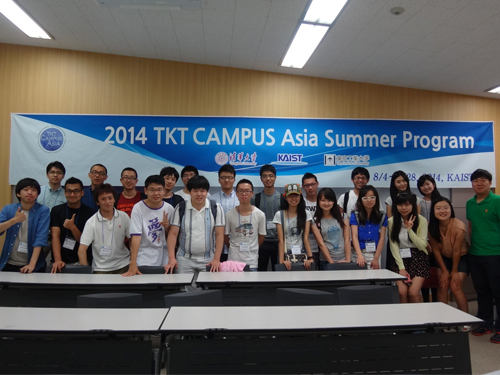 The 2014 CAMPUS Asia Summer Program
The CAMPUS Asia (Collective Action for Mobility Program of University Students in Asia) is an academic exchange program originally proposed at the third presidential meeting of three nations, Korea, China, and Japan, which was held in May 2010 on Jeju Island.
Under the proposal, three science and technology universities, Tsinghua University (China), KAIST (Korea), and Tokyo Institute of Technology (Japan), created a program in 2012 for academic and research collaboration, TKT CAMPUS Asia. Since then, each university has been hosting an exchange program in rotation.
The 2014 summer program of TKT CAMPUS Asia was held from August 4th through 28th at KAIST. A total of 13 professors from the departments of chemical engineering, mechanical engineering, and life science, as well as 25 students participated. Under the summer program, three courses in biotechnology, mechanical engineering, and Korean language were offered. The universities gave credits for all courses.
As part of TKT CAMPUS Asia, KAIST has also operated a semester study abroad and foreign exchange program and will begin a joint degree program by 2015.
Professor Jung Kim of the Department of Mechanical Engineering at KAIST said,
“Just as the Erasmus Program (European Community Action Scheme for the Mobility of University Students) contributed to the foundation of the European Union, we hope that the CAMPUS Asia will serve a similar goal for a greater Asia.”
2014.09.03 View 6255
The 2014 CAMPUS Asia Summer Program
The CAMPUS Asia (Collective Action for Mobility Program of University Students in Asia) is an academic exchange program originally proposed at the third presidential meeting of three nations, Korea, China, and Japan, which was held in May 2010 on Jeju Island.
Under the proposal, three science and technology universities, Tsinghua University (China), KAIST (Korea), and Tokyo Institute of Technology (Japan), created a program in 2012 for academic and research collaboration, TKT CAMPUS Asia. Since then, each university has been hosting an exchange program in rotation.
The 2014 summer program of TKT CAMPUS Asia was held from August 4th through 28th at KAIST. A total of 13 professors from the departments of chemical engineering, mechanical engineering, and life science, as well as 25 students participated. Under the summer program, three courses in biotechnology, mechanical engineering, and Korean language were offered. The universities gave credits for all courses.
As part of TKT CAMPUS Asia, KAIST has also operated a semester study abroad and foreign exchange program and will begin a joint degree program by 2015.
Professor Jung Kim of the Department of Mechanical Engineering at KAIST said,
“Just as the Erasmus Program (European Community Action Scheme for the Mobility of University Students) contributed to the foundation of the European Union, we hope that the CAMPUS Asia will serve a similar goal for a greater Asia.”
2014.09.03 View 6255 -
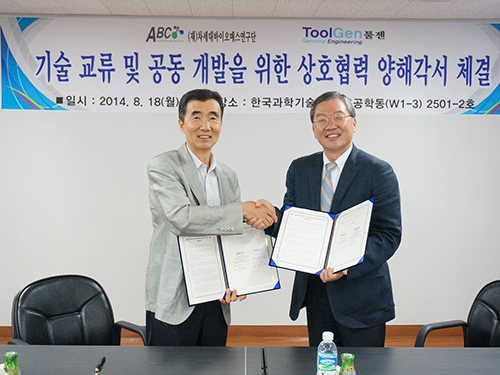 KAIST's Advanced Biomass R&D Center and ToolGen will cooperate
The Advanced Biomass R&D Center (ABC) at KAIST and ToolGen, Inc., a Korean biotechnology company focused on the development of engineered nucleases that can be used as essential tools for editing genetic information in microbial, plant, animal, and human cells, signed a memorandum of understanding (MOU) on August 18, 2014 for technology exchange and research collaboration.
ABC is headed by Executive Director Ji-Won Yang, a professor emeritus at the Department of Chemical and Biomolecular Engineering, and Chief Executive Officer Jong-Moon Kim for ToolGen.
The newly signed MOU encourages collaborations in the following areas:
- Development of genome editing technology for microalgae modification
- Development of microalgae that increases biofuel production through the
application of genome editing technology
- Creation of education and training programs for researchers
- Collaboration in other areas
In addition, the two organizations decided to cooperate in the improvement of biofuel yields using ToolGen’s genome editing technology, the commercialization of research outcomes, and the development of eco-friendly biofuels from biomass.
Executive Director Yang commented that “improving biofuel production is crucial to accelerate the commercialization of biofuels, and collaborating with ToolGen will help us realize that goal.” He further said that “The importance of this MOU lies in the fact that the global chemical industry including Korea has been making substantial efforts to shift its attention from a fossil fuel-based development to a more bio-based technology.”
Jin-Soo Kim, the director of the Genome Editing Research Center at the Institute of Basic Sciences in Korea and the cofounder of ToolGen, added that “ToolGen has successfully commercialized its third generation genetic scissors, which shows a lot of promise for commercialization. Our collaboration with KAIST will serve as the driving force to create new industries and accordingly, new jobs.”
2014.09.03 View 9620
KAIST's Advanced Biomass R&D Center and ToolGen will cooperate
The Advanced Biomass R&D Center (ABC) at KAIST and ToolGen, Inc., a Korean biotechnology company focused on the development of engineered nucleases that can be used as essential tools for editing genetic information in microbial, plant, animal, and human cells, signed a memorandum of understanding (MOU) on August 18, 2014 for technology exchange and research collaboration.
ABC is headed by Executive Director Ji-Won Yang, a professor emeritus at the Department of Chemical and Biomolecular Engineering, and Chief Executive Officer Jong-Moon Kim for ToolGen.
The newly signed MOU encourages collaborations in the following areas:
- Development of genome editing technology for microalgae modification
- Development of microalgae that increases biofuel production through the
application of genome editing technology
- Creation of education and training programs for researchers
- Collaboration in other areas
In addition, the two organizations decided to cooperate in the improvement of biofuel yields using ToolGen’s genome editing technology, the commercialization of research outcomes, and the development of eco-friendly biofuels from biomass.
Executive Director Yang commented that “improving biofuel production is crucial to accelerate the commercialization of biofuels, and collaborating with ToolGen will help us realize that goal.” He further said that “The importance of this MOU lies in the fact that the global chemical industry including Korea has been making substantial efforts to shift its attention from a fossil fuel-based development to a more bio-based technology.”
Jin-Soo Kim, the director of the Genome Editing Research Center at the Institute of Basic Sciences in Korea and the cofounder of ToolGen, added that “ToolGen has successfully commercialized its third generation genetic scissors, which shows a lot of promise for commercialization. Our collaboration with KAIST will serve as the driving force to create new industries and accordingly, new jobs.”
2014.09.03 View 9620 -
 The President of KAIST is appointed to the 10th International Academic Advisory Panel for the Singapore government
President Steve Kang will serve as a panelist to the 10th International Academic Advisory Panel (IAAP) of the Ministry of Education, Singapore, from February 2014 to February 2016. He was the first Korean who has ever served the panel for the Singapore government.
Chaired by the Deputy Prime Minister and the Minister of Finance of Singapore and comprised of 11 eminent international academics and corporate leaders, the IAAP was established in 1997 by the Education Ministry to advise the government on developing world-class universities. Since its inaugural meeting in 1997, the panel has met nine times.
The IAAP has been a valuable source of advice and guidance for the Ministry as well as higher education institutions in Singapore. The IAAP’s recommendations have had a significant impact on the development of Singapore’s university sector.
President Kang received his letter of appointment on August 22, 2014. The letter stated that “his experience in leading KAIST and insights on the challenges facing universities internationally will contribute well to the IAAP discussions.”
The 10th IAAP meeting will be held on June 24-26, 2015 in Singapore.
2014.08.25 View 6589
The President of KAIST is appointed to the 10th International Academic Advisory Panel for the Singapore government
President Steve Kang will serve as a panelist to the 10th International Academic Advisory Panel (IAAP) of the Ministry of Education, Singapore, from February 2014 to February 2016. He was the first Korean who has ever served the panel for the Singapore government.
Chaired by the Deputy Prime Minister and the Minister of Finance of Singapore and comprised of 11 eminent international academics and corporate leaders, the IAAP was established in 1997 by the Education Ministry to advise the government on developing world-class universities. Since its inaugural meeting in 1997, the panel has met nine times.
The IAAP has been a valuable source of advice and guidance for the Ministry as well as higher education institutions in Singapore. The IAAP’s recommendations have had a significant impact on the development of Singapore’s university sector.
President Kang received his letter of appointment on August 22, 2014. The letter stated that “his experience in leading KAIST and insights on the challenges facing universities internationally will contribute well to the IAAP discussions.”
The 10th IAAP meeting will be held on June 24-26, 2015 in Singapore.
2014.08.25 View 6589 -
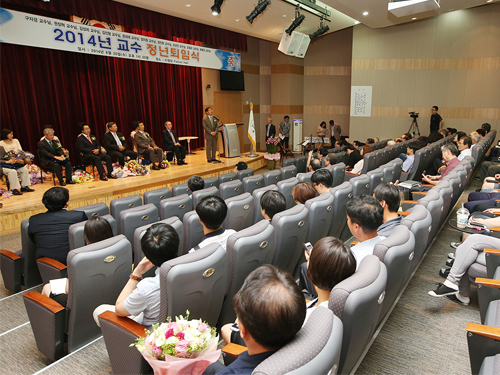 Retiring Faculty Honored
This year’s retirement ceremony took place on August 20, 2014 at Fusion Hall, KI Building, on campus. The ten faculty members whose average service to KAIST exceeded 25 years were honored at the ceremony. They have been appointed emeritus professors this month.
President Steve Kang noted their contributions to the development of KAIST, offering appreciation and recognition of each retiree. The retiring faculty members were:
Ja-Kyung Koo, Professor of Mathematical Sciences
Jang-Hyuk Kwon, Professor of Aerospace Engineering
Sung-Hee Kim, Professor of College of Business
Jin-Hyung Kim, Professor of Computer Science
Hie-Tae Moon, Professor of Physics
Ji-Won Yang, Professor of Chemical and Biomolecular Engineering
Chin-Wan Chung, Professor of Computer Science
Nam-Zin Cho, Professor of Nuclear and Quantum Engineering
Chul-Oh Cho, Professor of Biological Sciences
Byoung-Kyu Choi, Professor of Industrial and Systems Engineering
2014.08.23 View 6379
Retiring Faculty Honored
This year’s retirement ceremony took place on August 20, 2014 at Fusion Hall, KI Building, on campus. The ten faculty members whose average service to KAIST exceeded 25 years were honored at the ceremony. They have been appointed emeritus professors this month.
President Steve Kang noted their contributions to the development of KAIST, offering appreciation and recognition of each retiree. The retiring faculty members were:
Ja-Kyung Koo, Professor of Mathematical Sciences
Jang-Hyuk Kwon, Professor of Aerospace Engineering
Sung-Hee Kim, Professor of College of Business
Jin-Hyung Kim, Professor of Computer Science
Hie-Tae Moon, Professor of Physics
Ji-Won Yang, Professor of Chemical and Biomolecular Engineering
Chin-Wan Chung, Professor of Computer Science
Nam-Zin Cho, Professor of Nuclear and Quantum Engineering
Chul-Oh Cho, Professor of Biological Sciences
Byoung-Kyu Choi, Professor of Industrial and Systems Engineering
2014.08.23 View 6379